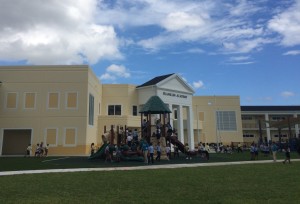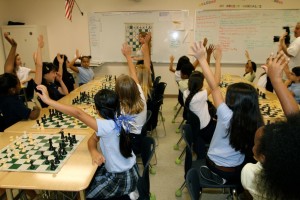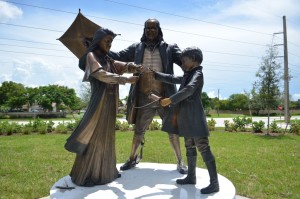
Sophia Salazar tried for nearly two decades to get her children into one of Broward County’s most sought-after school choice programs.
Her oldest, now 26, didn’t win the lottery for the district’s Nova schools. She sent her second-oldest to private school. But when one of her children finally gained admission to the district’s highly regarded partnership with Nova Southeastern University, she’d found a new first choice.
She started sending her three youngest children — a first grader, a fourth-grader and a sixth-grader — to the newest Franklin Academy charter school, which opened this fall in Sunrise, Fla.
“Franklin gave them a little more,” Salazar said. She drives he children daily from Hollywood, in southeastern Broward, to the suburb near the western edge of the county. The commute, she said, is worth it. “If my kids are happy to wake up in the morning and be the first one here, that’s how I know.”
At a time when national charter school advocates are wondering how their movement can attract more suburbanites, Franklin Academy charter schools managed to thrive in the already-choice-heavy school systems of South Florida. In five years, the network overseen by the Florida Charter Foundation has grown to enroll more than 6,000 students on five campuses in Broward and Palm Beach Counties. Its combined waiting lists stretch into the thousands. Plans are in the works to add a sixth campus — its first for high school grades — and to roll out International Baccalaureate programs.
The relatively young charter school network has gotten some high-profile help, including a facilities investment backed by retired tennis star Andre Agassi. It’s caught on in part because it hits a sweet spot for parents like Salazar, providing a private-school feel with public-school oversight.
Daniel Sandberg, the principal at the new Sunrise campus, said parents come looking for one thing above all else.
“They’re looking for rigor,” he said. Sometimes, he added, they tell him: “School seems a lot harder here.”

Students wear uniforms, and are divided by gender for core-subject classes. They start taking daily chess classes in kindergarten, a tactic some private schools have also used to instill strategic thinking. Vladlena Ciubara, Franklin’s chess teacher in Sunrise, is a former Romanian champion, and teachers at other locations have also played professionally.
In other words, Franklin Academy offers amenities that might otherwise only be available in exclusive private schools. As a charter school, Sandberg said, “We’re not only providing that and more, but we’re adhering to state standards.”
The network also has a “no-homework” policy, under which teachers prescribe after-school studying based on individual students’ needs, rather than handing out blanket assignments.
State reports show about three-fourths of students at Franklin Academy’s Broward campuses are racial or ethnic minorities. Around 40 percent qualified for free- or reduced-priced lunches during the 2013-14 school year, a lower rate than the surrounding school district.
Salazar, who sends three children to the Sunrise campus, said she also entered her children in the lottery at its Cooper City location, closer to where she lives, but there weren’t enough spots available. State Department of Education data show thousands of other parents remain on the schools’ waiting lists, and Scott Sznitken, the charter foundation’s executive director, said those numbers have likely climbed since the last state survey was taken.
State data also show Franklin Academy schools have attracted dozens of transfers from private schools. Its Boynton Beach campus alone attracted 94 such transfers during the 2013-14 school year. But enrollment figures suggest this is largely a function of the schools’ size. The vast majority of their students come from other other public schools.

To keep attracting parents, Sznitken said schools need to take pride in the little things. The Franklin Pass dismissal system illustrates his point. The schools give parents RFID stickers. When they approach campus in their cars to pick up their children, sensors alert teachers, who then know which students to release. In the hallways, color-coded arrows line the floors. Blue arrows direct students to the car lines; yellow arrows lead to buses.
A flat management structure helps the schools engineer quicker dismissals. Sznitken said the charter network can make changes without scheduling committee meetings or navigating a large bureaucracy.
“It starts down at the teacher level,” he said. “If the cafeteria lady’s got a great idea, we’ll listen to it.”
Broward County is home to one of the most charter-heavy districts in the United States. Palm Beach isn’t far behind. As more options become available, Sznitken said, schools are going to need to do more to compete.
“I think parents’ expectations are changing … I think the model has changed, and that we’re in the right space,” he said. “At the end of the day, quality will rise above the quantity.”
Correction: An earlier version of this story incorrectly stated the speed with which Franklin Academy completes dismissals.


